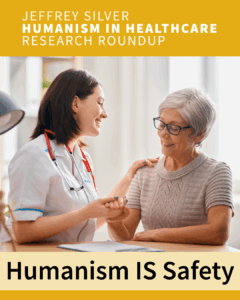 The Jeffrey Silver Humanism in Healthcare Research Roundup features summaries of recently published studies on humanism in healthcare. To receive email notification of new studies once per month, enter your information here and select “Jeffrey Silver Research Roundup” from the checkboxes at the bottom. See previous posts in this series.
The Jeffrey Silver Humanism in Healthcare Research Roundup features summaries of recently published studies on humanism in healthcare. To receive email notification of new studies once per month, enter your information here and select “Jeffrey Silver Research Roundup” from the checkboxes at the bottom. See previous posts in this series.
Publications from Gold Foundation-Affiliated Authors
Clinician-family communication about patients’ values and preferences in intensive care units. Free full text Scheunemann LP, Ernecoff NC, Buddadhumaruk P, Carson SS, Hough CL, Curtis JR, Anderson WG, Steingrub J, Lo B, Matthay M, Arnold RM, White D. JAMA Intern Med. 2019 Apr 1.
Dr. Robert Arnold is a Mapping The Landscape grantee.
The Intensive Care Unit is a harrowing place in which seriously ill patients largely depend upon the shared decision-making of others, like clinicians and family members, to consider what outcomes and quality of life would be acceptable. But how does this shared decision-making take place? Leslie Scheunemann and colleagues investigated this question by analyzing about 250 clinician-family conference transcripts conducted at 13 intensive care units in 6 U.S. medical centers. They found that 1 in 4 conferences did not contain any information exchange or deliberation about the patient’s values and preferences, and only 1 in 3 addressed physical, cognitive, and social functioning or spirituality. Altogether, only 1 in 12 treatment recommendations by clinicians were based on the patient’s perceived values and beliefs. While daunting, the authors note that this represents an opportunity for interventions to improve clinician communication skills.
Assessment of job satisfaction and feeling valued in academic medicine. Free full text Simpkin AL, Chang Y, Yu L, Campbell EG, Armstrong K, Walensky RP. JAMA Intern Med. 2019 May 6.
Dr. Arabella Simpkin is a Mapping the Landscape grantee.
In recent years, physician well-being has become a pressing topic, with job satisfaction being described as a major contributor to well-being. But what factors contribute to physician job satisfaction? Arabella Simpkin and colleagues examined this question among internal medicine physicians at the Massachusetts General Hospital through an online questionnaire. Among the different variables that they looked at, only three were significantly associated with job satisfaction: (1) working in a social and supportive environment, (2) feeling treated with respect, and (3) feeling valued, which, in turn, was associated with feeling cared about as a person, not feeling taken for granted, feeling resources were provided for professional growth, and not feeling discriminated against because of their sex. Interestingly, race/ethnicity, rank, and feeling fairly compensated were not independently associated with feeling valued or job satisfaction. Although the findings are limited to one site, it does suggest that, to improve job satisfaction, institutions should foster cultures that promote a sense of being valued, respected, and treated fairly.
Implicit bias and the feedback paradox: exploring how health professionals engage with feedback while questioning its credibility. Sukhera J, Wodzinski M, Milne A, Teunissen PW, Lingard L, Watling C. Acad Med. 2019 Apr 30.
Drs. Javeed Sukhera, Lorelei Lingard, and Christopher Watling are Mapping the Landscape grantees.
Feedback is a critical aspect in healthcare professions education that enables professional growth. However, because feedback often challenges self-perceptions and sense of identity, it may inadvertently lead to unfavorable reactions that limit the usefulness of such feedback. To explore this phenomenon, Javeed Sukhera and colleagues sampled 32 psychiatry nurses, psychiatrists, and psychiatric residents in Ontario, Canada, after taking an implicit association test (IAT) for mental illness. They then interviewed the participants to identify their experiences in reconciling their self-perceived bias with the results of the IAT. Overall, they found that “while most participants critiqued and questioned the credibility of the IAT, they described their experience of receiving feedback about their implicit biases as positive or neutral.” This may represent a paradox, in which participants who question the credibility of threatening self-related feedback still find some utility. The authors conclude by calling for further research to better understand how participants reflect on emotionally challenging feedback.
A lexicon of concepts of humanistic medicine: exploring different meanings of caring and compassion at one organization. Stergiopoulos E, Ellaway RH, Nahiddi N, Martimianakis MA. Acad Med. 2019 Apr 2.
Drs. Rachel Ellaway and Tina Martimianakis are Mapping the Landscape grantees.
As healthcare continues to adapt to patient needs and desires in the 21st century, there has been a deeper exploration into humanism and compassion as cornerstones of medical practice. But what do these terms mean and how do we use them? Erene Stergiopoulos and colleagues mapped the language of humanistic medicine as part of the Phoenix Project, an initiative of the Associated Medical Services (AMS). They utilized two focus groups to explore how to identify and interpret the core concepts used in the project, and then looked at an extensive text archive of fellowship and grant applications, conference proceedings, blogs, and websites from the AMS. Through critical discourse analysis, they identified two core terms: care/caring and compassion, as well as eight related clusters: (1) collaboration between health professionals, (2) collaboration with patients, (3) patient outcomes, (4) health care quality, efficiency, and effectiveness, (5) compassion, social justice, and equity, (6) healing, wholeness and suffering, (7) technology and compassion, and (8) technical knowledge, practice, and compassion. This study allowed the investigators to clarify the efforts and focus of the AMS, and explore a method that can be used elsewhere to better define humanism in healthcare.
Other Publications
A systematic review of the quality and utility of observer-based instruments for assessing medical professionalism. Kwan YH, Png K, Phang JK, Leung YY, Goh H, Seah Y, Thumboo J, Ng ASC, Fong W, Lie D. J Grad Med Educ. 2018 Dec;10(6):629-638.
Although professionalism is well-recognized as a core competency of medical practice, there is much less agreement as to which are the best tools to assess medical professionalism. To help identify these tools, Yu Heng Kwan and colleagues performed a systematic review to appraise the quality and utility of observer-based instruments. They ultimately found 10 instruments from 16 studies, of which the P-MEX (Professionalism Mini-Evaluation Exercise) and EOS (Education Outcomes Service) group questionnaire appeared to have the best data about reliability and other test characteristics. Additionally, the P-MEX seemed to have better utility than the EOS group questionnaire (based on the authors’ checklist), rendering it more suitable as an observer-based instrument for formative assessment of professionalism in students and residents.
Investigating the feasibility of brief compassion focused therapy in individuals in treatment for opioid use disorder. Free full text Carlyle M, Rockliff H, Edwards R, Ene C, Karl A, Marsh B, Hartley L, Morgan CJ. Subst Abuse. 2019 Apr 2;13:1178221819836726.
Opioid use disorder is both a devastating and difficult-to-treat condition, in part because individuals may use opioids to help deal with deeper problems associated with unpleasant emotional states, like self-criticism, guilt, and shame. One possible method to help address this is compassion-focused therapy (CFT), where individuals learn to “shift attention from shaming the self … to how to work with them compassionately.” To assess the feasibility and acceptability of this approach, Molly Carlyle and colleagues created a short group intervention of three 2-hour sessions over 3 weeks consisting of compassion-oriented psychoeducation and self-compassion exercises. They then randomly assigned individuals to the CFT group, an active (relaxation) control group, or a waitlist group. Among the 69 individuals who agreed to join the study, 68% attended a baseline visit, and only 1 in 5 dropped out. Although the study was not designed to compare clinical outcomes, the investigators conclude that compassion-focused therapy is a feasible approach and perhaps should be investigated in a randomized control trial.
Can patient-centered communication reduce the effects of medical mistrust on patients’ decision making? Cuevas AG, O’Brien K, Saha S. Health Psychol. 2019 Apr;38(4):325-333.
Mistrust in healthcare institutions is a major cause of patient dissatisfaction, nonadherence, avoidance, and underuse of healthcare services, particularly for African-Americans. Patient-centered communication (PCC) may reduce these effects, but how exactly mistrust in the healthcare institutions influences patient decisions remains unclear. Adolfo Cuevas and colleagues recruited 230 primary care patients who first completed a survey to assess mistrust and then viewed standardized vignettes of a cardiologist recommending an intervention. Using complex quantitative techniques to assess the relationship between race, medical mistrust, and PCC, they determined that mistrust in healthcare institutions may lead to mistrust in physicians. Empathic and responsive PCC is able to reduce this mistrust. While this study evaluated hypothetical situations, it provides insight into how patient-centered communication may improve quality of care in real-world settings.
Attitudes toward obese people: a comparative study of nursing, education, and social work students. Darling R, Atav AS. J Prof Nurs. 2019 Mar – Apr;35(2):138-146.
Obesity is a pressing nationwide problem, affecting approximately 1 in 3 Americans. Indeed, it increases the risk for cardiovascular disease, diabetes, dementia, and cancer, among other conditions. Despite this, obese patients are less likely to obtain timely healthcare, and negative weight biases are believed to be major contributors to this discrepancy. To identify how prevalent weight biases are, Rosa Darling and A. Serdar Atav surveyed 403 undergraduate and graduate nursing students, 35 graduate education students, and 88 graduate social work students using standardized instruments (Attitudes Toward Obese Persons [ATOP] and Beliefs About Obese Persons [BAOP] Scales). They found that negative attitudes regarding obesity were more likely to be found in younger students, nursing students, and those who did not report having a friend/family member who is overweight. Interestingly, gender, location of residence, perceptions of one’s own body weight, and participation in an exercise regimen were not associated with negative attitudes.
Cultural competence of baccalaureate nurse faculty: relationship to cultural experiences. Farber JE. J Prof Nurs. 2019 Mar – Apr;35(2):81-88.
Cultural competency in nursing education is becoming more important, as nurses are tasked with caring for more patients from varied cultural backgrounds. But how do nurse faculty, who train younger nurses, gain cultural competency? Janice Farber investigated this through a survey of 118 full-time nurse faculty in the United States. She used the Cultural Competence and Confidence (CCC) model and the Transcultural Self-Efficacy Tool (TSET) to measure cognitive (e.g. knowledge and skills), affective (e.g. values and beliefs), and practical (e.g. communication) nursing skills. She found that nurse faculty are most confident about their transcultural attitudes but least confident about their transcultural knowledge. This may be because most faculty lacked experiences in being abroad, in teaching transcultural nursing care concepts, and in formalized education training and workshops. Such formal preparation may improve knowledge, attitudes, and communication skills.
Development and validation of a tool to measure patient assessment of clinical compassion. Free full text Roberts BW, Roberts MB, Yao J, Bosire J, Mazzarelli A, Trzeciak S. JAMA Network Open. 2019 May 3;2(5):e193976.
Compassion is an essential element of high-quality care, and studies have demonstrated that patient perception of compassionate care is associated with better outcomes and lower costs. But measuring compassion is fairly difficult. Brian Roberts and colleagues sought to develop a measurement tool using a 12-item survey distributed to 3,325 adult patients within the Cooper Union Healthcare System in New Jersey. Using advanced statistical methods, they were able to reduce the number of items from 12 to 5, and validate its properties in 3,483 more patients. Overall, they determined that the 5-item questionnaire was reliable and easy to use. However, the low response rate (about 15%), single-center setting, and a skew in scores toward high compassion limit the strengths of these conclusions.


